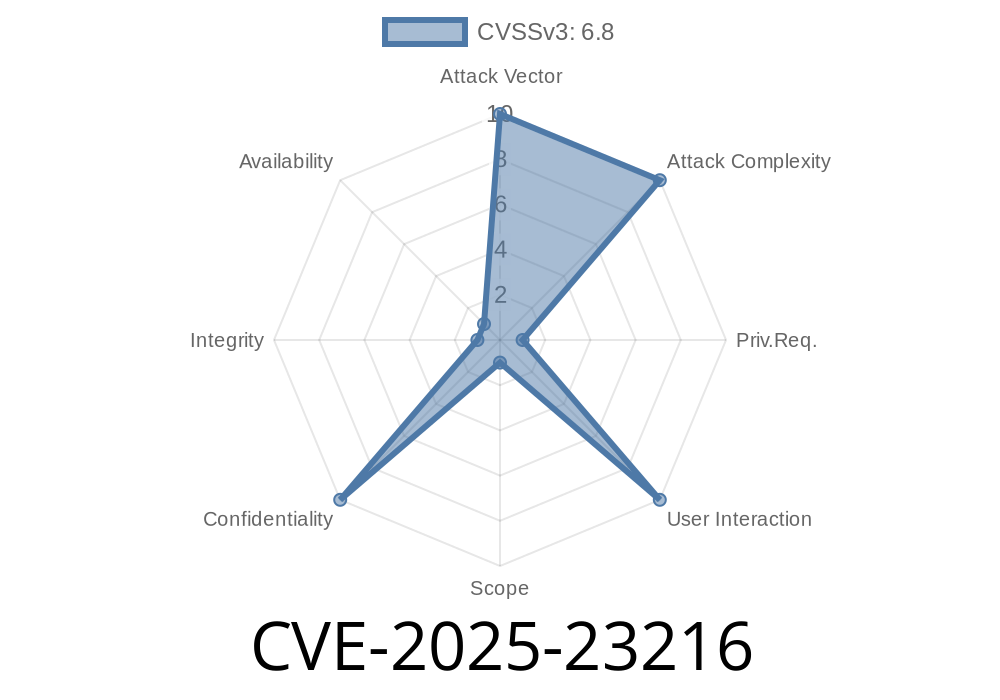CVE-2025-23216 is a serious vulnerability affecting Argo CD, an open-source, declarative, GitOps continuous delivery tool for Kubernetes. The bug exposed sensitive data—like secrets—even to users who only had read access to Argo CD, simply by exploiting how errors (and diffs) were displayed when syncing invalid Kubernetes Secret resources.
This post explains how the vulnerability worked, offers a step-by-step exploit demonstration, and shows how you can secure your clusters.
Quick Summary
- Issue: Secrets can be exposed in error messages/diffs if a user commits an invalid Kubernetes Secret to a Git repository managed by Argo CD.
- Who is impacted: Anyone using affected Argo CD versions before v2.13.4, v2.12.10, or v2.11.13.
- Severity: Moderate, since write access to the Git repo is required—but could lead to full database/cluster compromises.
- Fix: Upgrade to Argo CD v2.13.4, v2.12.10, or v2.11.13.
In Argo CD, you define Kubernetes objects (like Secrets) in YAML files stored in a Git repository
apiVersion: v1
kind: Secret
metadata:
name: my-secret
type: Opaque
data:
password: c3VwZXJfc2VjcmVCg==
When you push this file to Git, Argo CD will sync it to your Kubernetes cluster. Normally, Argo CD never prints the actual values of secrets in its UI or logs—it masks or hides them for security.
Exploiting the Bug
But, if you (or anybody with repo write access) commit a malformed or invalid Secret, Argo CD would attempt to sync it and, if an error occurs, would expose decoded secret values in the "diff" view and error messages.
Here's an example YAML file with a typo in the secret data
apiVersion: v1
kind: Secret
metadata:
name: my-vulnerable-secret
type: Opaque
data:
password: not_base64!!! # Invalid Base64
Now, you push this to your repository. Argo CD (before the patch) will try syncing it to your cluster and fail. But here’s the problem: the Argo CD UI will display a detailed error, including the raw value of “password”, to anyone with read access.
Demo: Viewing the Secret in Argo CD
Step 1: Commit and push the invalid secret to your GitOps repo.
Step 2: Wait for Argo CD to sync it. The UI, CLI, or API will show a diff/error message like
error: failed to decode secret.data.password: illegal base64 data at input byte 3
But, in certain cases, the actual contents (not_base64!!!) would be visible in the UI, sometimes in plaintext or as part of a diff.
Step 3: Any Argo CD user with read access can view the Application, open the diff, and see the exposed secret data.
Why Is This a Problem?
Secrets are base64-encoded, but often contain API keys, passwords, or cryptographic tokens. If even one attacker (or careless developer) can intentionally/accidentally commit a bad Secret resource, all Argo CD users who can view applications could access plaintext secrets.
Anyone with write access to your GitOps repo (developers, CI systems)
- Anyone with Argo CD UI/API access (even read-only roles) could then see the secrets if the bug is triggered
Argo CD tries to sync and fails.
In the UI, check the Application's "diff" or "events" tab. Notice the error, and look for exposed data in the object diff/code.
!Example of exposed secret in Argo CD UI
To fix CVE-2025-23216, upgrade to one of these versions or later
- v2.13.4 release notes
- v2.12.10 release notes
- v2.11.13 release notes
kubectl -n argocd set image deployment/argocd-server argocd-server=argoproj/argocd:v2.13.4
*(Check your install method and upgrade docs for the exact procedure)*
4. References
- Official GitHub Advisory: GHSA-6hj5-chmq-74gh
- CVE-2025-23216 entry at MITRE (pending publication)
- Argo CD Documentation
Final Thoughts
CVE-2025-23216 is a perfect reminder that security does not end with secrets management—you need defense in depth. Always upgrade your tools, monitor for exposures, and use guardrails (like Git hooks and CI checkers) in your DevOps workflows. Even simple mistakes in configuration files can have big effects in modern, automated deployments.
Timeline
Published on: 01/30/2025 16:15:31 UTC
